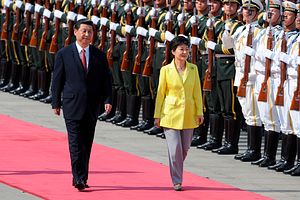In the past few months, a retired Chinese general suggested that China should not support North Korea if it collapses; the United States has agreed to indefinitely remain South Korea’s national security guarantor; and North Korean leader Kim Jong-un has hinted that he will likely visit Moscow before Beijing (North Korea’s traditional benefactor). It has been a good run for South Korea, given also its impressive economic rise, balanced budgets, and regular trade surpluses, not to mention its continuing ability to keep Japan off-balance regarding the Pacific War.
For a middle power, South Korea plays its moderate hand relatively well. Hemmed-in by North Korea, asymmetrically dependent on the U.S., and often culturally overshadowed by its larger neighbors, South Korea might easily have been overwhelmed by its challenging neighborhood. But it has not been. It plays a larger role than its size would indicate.
Korean Grand Strategy
South Korea’s primary strategic challenge is maintaining national autonomy in a very tough neighborhood. Korea is a middle power, surrounded by three great powers – China, Japan, and Russia. Geopolitically, this is a terrible location. Indeed, it may be uniquely trying. Other small states, such as Mongolia or Paraguay, are surrounded and dwarfed by their neighbors, but in Korea’s case there are three neighbors, not two, and all three have been great powers for centuries. Such extreme asymmetry all but ensures meddling by neighbors seeking to gain advantage against one other. Historically, Korea has often been a buffer to be neutralized, a spoil of war, a concession to be traded.
In the past, Korea was often manipulated or bullied by its much larger neighbors. During the Joseon period (late fourteenth to late nineteenth centuries) Korea was traditionally in thrall to China. It was also invaded by Japan (in the 1590s) and bullied by the Manchus. An independent foreign policy line was nearly impossible.
As Russian and Japanese power grew in Asia in the later nineteenth century, Korea became something of geopolitical football between them and declining China. It was in this period that Japanese Meiji strategists notoriously termed Korea “a dagger pointed at the heart of Japan.” (In fact, it was a Prussian advisor, Klemens Meckel, who coined that expression, but the Japanese military fully accepted that interpretation.) Korea was among Imperial Japan’s first targets. From 1910 to 1945, it was a Japanese colony.

































